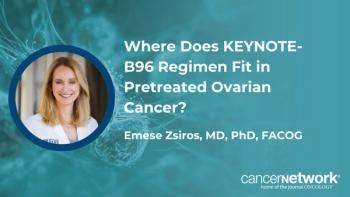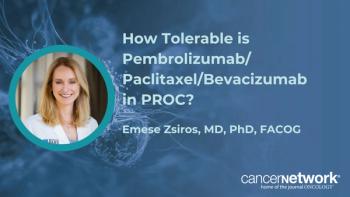
- ONCOLOGY Vol 20 No 1
- Volume 20
- Issue 1
Gynecologic Commentary (Kohlmann): Manifestations of Hereditary Nonpolyposis Colorectal Cancer
In their article, Taylor and Mutchbring attention to the gynecologiccancer risks associated with hereditarynonpolyposis colorectal cancer(HNPCC).[1] The identificationof individuals and families at risk forHNPCC has often focused on the coloncancer phenotype, but the diagnosisof endometrial or ovarian cancershould also be considered.
In their article, Taylor and Mutch bring attention to the gynecologic cancer risks associated with hereditary nonpolyposis colorectal cancer (HNPCC).[1] The identification of individuals and families at risk for HNPCC has often focused on the colon cancer phenotype, but the diagnosis of endometrial or ovarian cancer should also be considered. Lu and colleagues conducted a study of 101 women with HNPCC who developed metachronous cancers and found that 51% had endometrial or ovarian cancer as their presenting diagnosis, highlighting the need for awareness of HNPCC in the gynecologic community.[2] Among these women, the average time between the diagnosis of the gynecologic cancer and the second cancer, predominantly colon cancer, was 11 years. Implementation of annual screening colonoscopies during this time may have prevented the majority of these cancers. Continued education about HNPCC is necessary for medical professionals, particularly those in subspecialties that encounter patients presenting with extracolonic HNPCCrelated cancers. Risk Factors
The authors cite three risk factors associated with harboring a germline mismatch repair mutation: diagnosis of two or more HNPCC-related cancers, diagnosis under 60 years of age, or the tumor exhibiting microsatellite instability (MSI).[1] However, the optimal approach for identifying patients with HNPCC from women presenting with gynecologic cancers has not yet been determined. The diagnosis of multiple primary cancers is a classic feature of hereditary cancer syndromes. This is most easily addressed when individuals present with synchronous malignancies. However, many of the second cancers will present later, and the data from Lu et al indicate that missing the diagnosis of HNPCC at the time of the first cancer does not allow for implementation of screening and prevention measures to reduce the risk of developing a second cancer.[2] Age also may not be a straightforward criterion, as Hampel et al have recently reported that the median age of onset for endometrial cancer in HNPCC families is 62 years.[3] These data indicate that relying on early age of onset may not be sufficient for identifying high-risk families. However, increasing the cutoff age for HNPCC screening will result in many more tumors requiring MSI testing and immunohistochemistry analysis, and potentially additional studies to differentiate those tumors with methylation of MLH1 rather than a germline mutation. The authors cite a study by Sumoi et al, which demonstrated the presence of HNPCC in approximately 3% of women diagnosed with endometrial cancer under age 60.[4] Berends and colleagues found that a family history of HNPCC-related cancer greatly increases the likelihood of detecting a mismatch repair mutation in young women with endometrial cancer.[5] The final risk factor described by the authors is that the tumor exhibits MSI. While MSI is certainly a red flag for HNPCC, most medical cen- ters do not routinely screen endometrial cancers with MSI testing and immunohistochemistry. Rather the tumor-tissue analysis is performed as the first step in the evaluation process once the patient has been identified as being at risk for HNPCC. Therefore, knowledge of MSI status is not likely to be available to most clinicians when they try to decide if further evaluation for HNPCC is warranted. Screening Guidelines
The Bethesda guidelines and the National Comprehensive Cancer Network (NCCN) guidelines provide criteria for identifying appropriate candidates to screen for HNPCC with MSI and immunohistochemistry analysis.[ 6,7] These guidelines recommend that individuals diagnosed with colon cancer at a young age, individuals diagnosed with multiple primary HNPCC-related cancers, or individuals with an HNPCC-related cancer who have first- or second-degree relatives with HNPCC-related cancers be evaluated for HNPCC. Further studies are needed to determine the sensitivity, specificity, and cost-benefit of various risk assessment criteria for patients presenting with gynecologic cancers. The risk factors described by Taylor and Mutch, these published guidelines, and consideration of the medical and family history for other risk factors for endometrial and ovarian cancer will help identify appropriate candidates for HNPCC evaluation. Consensus guidelines recommend using a combined approach with transvaginal ultrasound and endometrial aspiration to screen for endometrial cancer. However, studies have only evaluated the effectiveness of ultrasound.[ 7,8] Studies of the combined screening approach would be helpful to verify the efficacy of these recommendations. A study of women presenting for genetic counseling and testing for HNPCC found that 86% had not had any screening for endometrial cancer.[9] The low levels of screening may be due to the lack of awareness of the gynecologic cancer risks and the lack of data supporting a specific screening regimen. Education about signs and symptoms should be a part of counseling patients about HNPCC, since most endometrial cancers are diagnosed outside of screening and are treatable when detected at an early stage. Genetic Counseling and Testing
Genetic counseling services are widely available, and are helpful for providing risk assessment, coordinating testing, and facilitating the use of genetic information to make medical decisions and to inform family members of risk. Studies have not found that the process of undergoing genetic testing for a hereditary cancer predisposition is associated with clinically significant increases in anxiety or depression.[ 10] However, many individuals from families with known mismatch repair mutations may choose not to undergo testing. Fear regarding genetic discrimination has been found to be a barrier to pursuing genetic testing.[11] As Taylor and Mutch point out, no data indicate an increased risk of discrimination associated with genetic testing, and this should be communicated to patients to reduce such concerns. Cancer-related genetic counseling and testing resources can be found through the National Society of Genetic Counselors (http://www.nsgc.org) and the National Cancer Institute Provider Directory (http://www.cancer.gov/ search/genetics_services/). Taylor and Mutch's review of the gynecologic cancer risks associated with HNPCC illustrates that a multidisciplinary team approach is necessary to provide these families with comprehensive care as well as to expand research on the optimal approaches to managing extracolonic malignancies in HNPCC.
Disclosures:
The author has no significant financial interest or other relationship with the manufacturers of any products or providers of any service mentioned in this article.
References:
1. Taylor N, Mutch DG: Gynecologic manifestations of hereditary nonpolyposis colorectal cancer: From inherited to sporadic disease. Oncology 20:85-94, 2005.
2. Lu KH, Dinh M, Kohlmann W, et al: Gynecological cancer as a "sentinel cancer" for women with hereditary nonpolyposis colorectal cancer syndrome. Obstet Gynecol 5:569-574, 2005.
3. Hampel H, Stephen JA, Pukkala E, et al: Cancer risk in hereditary nonpolyposis colorectal cancer syndrome: later age of onset. Gastroenterology 129:415-421, 2005.
4. Sumoi R, Hkala-Ala-Pietila T, Leminen A, et al: Hereditary aspects of endometrial adenocarcinoma. Int J Cancer 62:132-137, 1995.
5. Berends MY, Wu Y, Sijmas RH, et al: Toward new strategies to select young endometrial cancer patients for mismatch repair gene mutation analysis. J Clin Oncol 21:4364-4370, 2003.
6. Umar A, Boland CR, Terdiman JP, et al: Revised Bethesda guidelines for hereditary nonpolyposis colorectal cancer (Lynch syndrome) and microsatellite instability. J Natl Cancer Inst 96:261-268, 2004.
7. National Comprehensive Cancer Network: Colorectal cancer screening: Clinical practice guidelines in oncology. JNCCN 1:72- 93, 2003.
8. Burke W, Petersen G, Lynch P, et al: Recommendations for follow-up care of individuals with an inherited predisposition to cancer: 1. Hereditary nonpolyposis colon cancer. Cancer Genetics Studies Consortium. JAMA 277:915-919, 1997.
9. Lynch HT, Lemon SJ, Karr B, et al: Etiology, natural history, management and molecular genetics of hereditary nonpolyposis colorectal cancer (Lynch syndromes): Genetic counseling implications. Cancer Epidemiol Biomarkers Prev 6:987-991, 1997.
10. Vernon SW, Gritz ER, Peterson SK, et al: Intention to learn results of genetic testing for hereditary colon cancer. Cancer Epidemiol Biomarkers Prev 8:353-360, 1999.
11. Hadley DW, Jenkins J, Diamond E, et al: Genetic counseling and testing in families with hereditary nonpolyposis colorectal cancer. Arch Intern Med 163:573-582, 2003.
Articles in this issue
about 20 years ago
Twenty Years of Systemic Therapy for Breast Cancerabout 20 years ago
Commentary (Moller): Surgical Staging in Endometrial Cancerabout 20 years ago
Commentary (Hudis): Twenty Years of Systemic Therapy for Breast Cancerabout 20 years ago
Gynecologic Manifestations of Hereditary Nonpolyposis Colorectal Cancerabout 20 years ago
Commentary (Hernandez): Surgical Staging in Endometrial CancerNewsletter
Stay up to date on recent advances in the multidisciplinary approach to cancer.












































